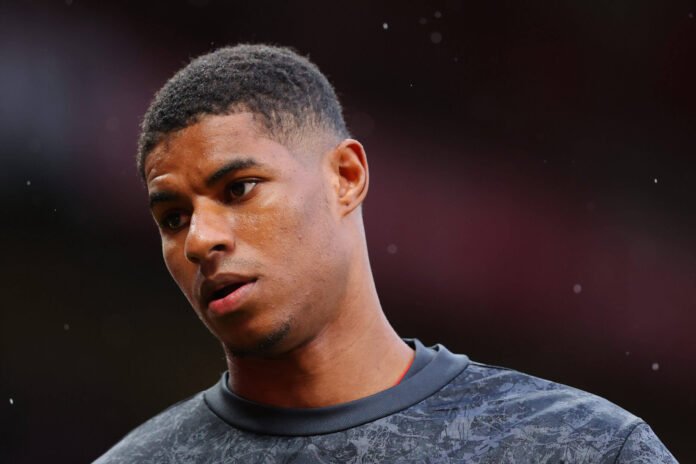The writing had been on the wall for Marcus Rashford. He only got 15 minutes when England played warm-up matches against Brazil and Belgium in March. He left that camp with a clear warning from manager Gareth Southgate that he had “a battle on his hands” to make the squad for Euro 2024.
It was a battle Rashford just didn’t seem ready for. In confirming the Manchester United forward’s absence from the 33-man squad for the pre-tournament training camp (to be cut to 26 before they depart for Germany next month), Southgate spoke of having had to make “difficult calls” — by which he appeared to mean an awkward telephone call to the player, rather than an agonising decision that preceded it.
“With Marcus, I just feel that other players in that area of the pitch have had better seasons,” Southgate said.
Rashford cannot dispute that. Southgate had Phil Foden, Bukayo Saka and Jack Grealish among his alternatives in wide attacking positions. This season has brought the emergence of Cole Palmer and Anthony Gordon, while Ollie Watkins and Ivan Toney have emerged as the preferred back-up options to Harry Kane at centre-forward.
By contrast, Rashford has scored eight goals in 42 matches in all competitions for United — down from a career-best 30 goals in 56 appearances last term. Like Jordan Henderson, he has paid the price for a wretched campaign.
Southgate says it’s “as simple as that”. And in many ways, it looks like that. But is it really just a case of a footballer losing form, a disappointing setback in a career that still has so much promise? The more you examine Rashford’s situation, the more complicated it starts to appear.
When Rashford, 26, signed a new contract at United last July, taking his basic wage this season to around £325,000 a week, John Murtough, the club’s football director at the time, declared that “working with Erik ten Hag and his coaches is the perfect environment for Marcus to continue to develop into one of the best attacking players in the world.”
It hasn’t looked ‘perfect’ this season. It often hasn’t in the eight years since his breakthrough as a teenager under Louis van Gaal.
There have been periods — under Ole Gunnar Solskjaer in 2020 and Ten Hag last season — when Rashford has looked such a natural talent, so at ease with his skillset, his role and status. There have been long periods when his form has gone awry and he has looked like a young man struggling under the intense spotlight and the weight of the burdens he has to carry on and off the pitch.
It is eight years since he broke into United’s first team as a teenager with a flurry of goals (eight in his first 18 appearances). He has scored 131 goals in 401 appearances in all competitions. It is a solid return rather than spectacular, but it has been streaky, as his totals for the past five seasons illustrate: 22, 21, 5, 30, 8.
This was the fifth season out of nine that he failed to reach double figures for Premier League goals — and his four double-figure tallies include a 10 and an 11 as well as two more impressive 17s.
Last season saw a period when he was performing his expected-goals (xG) by a remarkable margin, covered by the blue shaded area in the graph below. This season has seen him regress towards his mean performance — and at times well beyond it.
There is more to Rashford’s game than goals. But is there enough more?
It depends whether he is hot or cold. He is a fast, skilful player who dribbles and finishes well when he is on song, but he can look predictable. He lacks the creative instincts of Foden, Saka or Palmer and has never developed into the centre-forward he initially hoped to be. He has already made 461 senior appearances for club and country.
From the start, this season has been a struggle. Some fans accused him of settling into a comfort zone after signing his contract, but it has been one of those modern-day United campaigns where nothing and nobody looks right.
By the halfway stage, Rashford had two Premier League goals. He was performing miserably and attracting a lot of criticism.
He was publicly censured by Ten Hag in November for attending a nightclub after the derby defeat by Manchester City and was dropped to the bench for four consecutive games in December, but seemed to have had a mini-resurgence by the time he flew to Belfast to see a friend on a day off in late January.
That trip ended with Rashford reporting himself too ill to attend training at United, having been out in Belfast the night before. When he was absent from the squad for the FA Cup tie away to Newport County two days later, United initially claimed it was due to illness. The club later said, “This has been dealt with as an internal matter, which is now closed.”
Closed…but not forgotten. It left Ten Hag feeling let down. The manager has been frustrated by the player’s lack of conviction and consistency with the ball — including in areas where he was excelling last season — and by a perceived lack of defensive discipline without it.
Ten Hag places importance on how his attacking players perform out of possession, as the first line of defence. Alejandro Garnacho, Antony and Amad can all be inconsistent in that respect, but Ten Hag has expressed satisfaction at their efforts to adapt to his demands. Rashford’s absence from the starting line-up in recent weeks reflects concern about his off-the-ball work as much as his goal return.
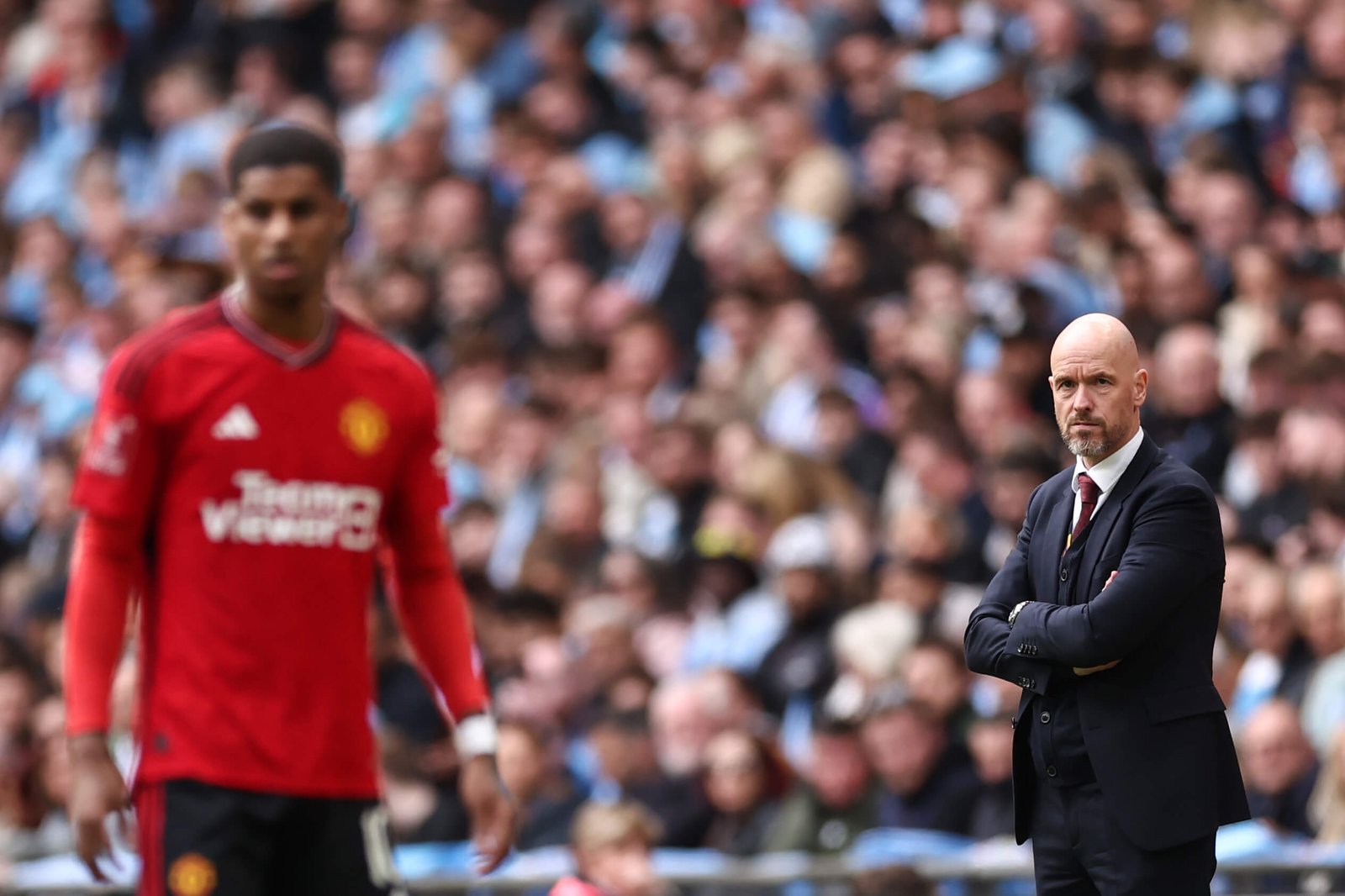
Rashford has not been the player he was in Ten Hag’s first season (Jacques Feeney/Offside/Offside via Getty Images)
After the Belfast episode, former United defender Rio Ferdinand suggested Rashford looked unhappy in a wider sense. “I’ve not seen Marcus showing that he loves what he’s doing for a while now and that would be concern,” Ferdinand told TNT Sports in January. “Body language is so important — and for a long time, his body language has been someone who seems stressed or not happy with where he’s at. As a club that’s the question I would want to ask him.”
The criticism that followed the Belfast incident prompted Rashford to release a 2,200-word first-person article on the Players’ Tribune website entitled “Who I really am”.
“They’re not really writing about me,” he said of the media coverage of that episode and others. “It’s like they’re writing about this character, ‘Marcus Rashford’.”
He described a media fixation with his salary, his car, his jewellery, his tattoos and his body language, “questioning my morals and speculating about my family and my football future”.
“There’s tone to it that you don’t get with all footballers,” he said. “Let’s just leave it at that.”
He is not the first BME player to imply a different “tone” to the coverage of his lifestyle. Chelsea forward Raheem Sterling has shared similar observations.
But what is clear is that the young man at the heart of this story — that’s Marcus Rashford, not “this character, Marcus Rashford” — has had a challenging time off the pitch as well as on it.
His mother Melanie Maynard, writing an article in The Times, referred to Rashford being hit hard by the death of a cousin and a friend in the past 18 months.
She made oblique reference to the “need to be wary of people’s intentions around you” when you are a high-profile footballer. “Sometimes people around you can be wolves dressed in sheep’s clothing,” she said.
Rashford has said he finds it hard to trust people. He has kept a relatively small team of people around him. As well as his mother and a couple of childhood friends, that includes his older brothers Dwaine Maynard and Dane Rashford, who are listed at Companies House in control of his management team D N May Sports Management. It includes PR adviser Caroline McAteer, whom he hired this season in an attempt to change the media and public narrative around him.
For three years Rashford engaged the services of PR adviser Kelly Hogarth, who worked with him on his much-praised campaign to end child food poverty during the COVID-19 pandemic.
He and his advisers then switched to Huxley, a boutique PR company, in the hope of pushing his brand onto the front pages of glossy magazines.
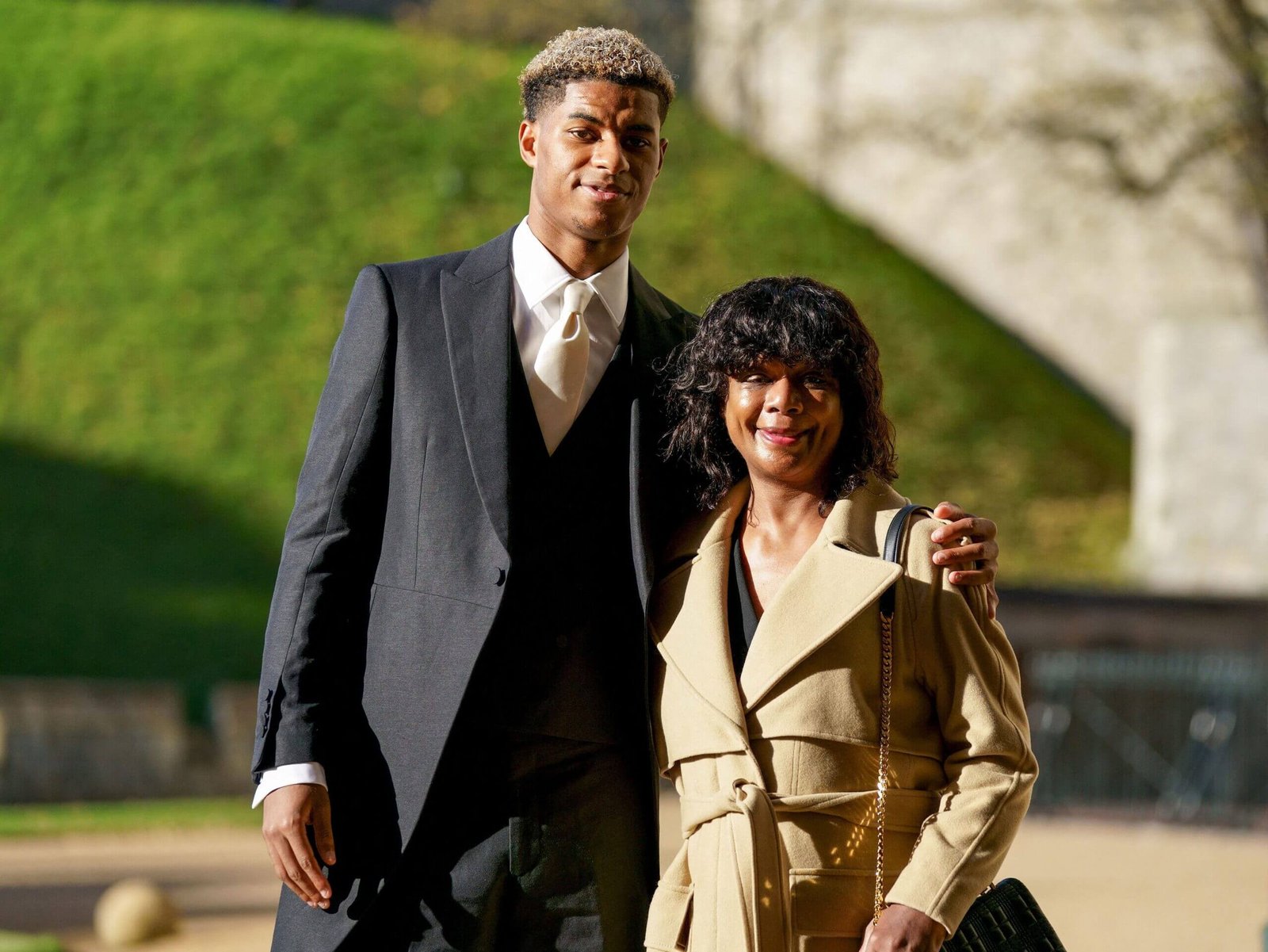
Rashford with his mum Maureen after collecting his MBE in 2021 (ANDREW MATTHEWS/POOL/AFP via Getty Images)
In December last year, faced with a growing weight of criticism over his performances at United, the priority changed again. This time Rashford engaged McAteer, best known within sport for helping to transform David Beckham’s public and media image in the late 1990s and early 2000s.
There are interviews when Rashford suggests he finds it easy to block out all the noise. But in that Players’ Tribune article he spoke of how “whenever I’ve been in my darkest places, and it feels like half the world is against me, I tend to go off by myself for a couple of days and reset — and then I’m fine.
“That’s just me being an introvert, needing my space to reset. Other times, when that hasn’t worked, I’ve found someone to talk to. Sometimes that’s the way to do it. But every single time I’ve been down, physically or mentally, I always feel like that’s when I turn it around and play my best football for United and England.”
For a time, the England set-up seemed to have become Rashford’s sanctuary. In contrast to many United players of the past, he appeared to perform better for country than club. During difficult times at United, he kept his England place and became a poster-boy for the cultural reset that has taken place under Southgate.
But that changed. Rashford was frustrated he didn’t start a single game at the last Euros, in the summer of 2021, and was deeply upset by the racist abuse he, Jadon Sancho and Saka suffered after missing in the penalty shoot-out in the final against Italy.
A combination of poor form and injuries meant he didn’t play for England for 16 months until an upturn in performances at United earned him a recall just in time for the 2022 World Cup, where he scored against Iran (as a substitute) and twice against Wales but was left out of the starting line-up against Senegal and France in the knock-out stage.
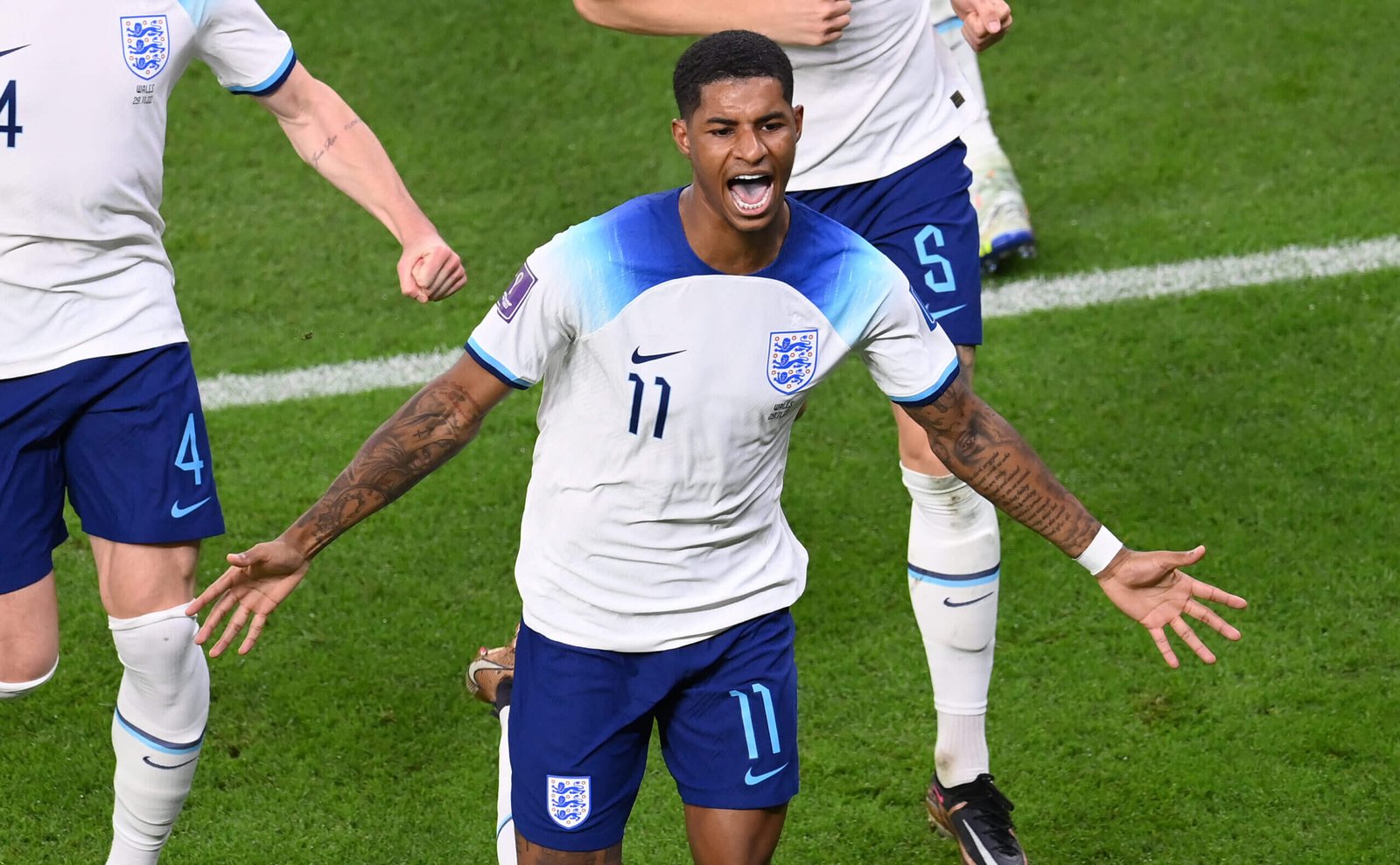
Rashford celebrates his first goal against Wales at the World Cup in Qatar (Stu Forster/Getty Images)
Of the 31 matches England have played since the delayed Euro 2020 finals, Rashford has appeared in 14 (five starts, nine as a substitute). As at United, any hopes of nailing down a regular starting place at centre-forward seemed to have fallen by the wayside.
“He wants to play for England, he loves playing for England and the opportunity to play in tournaments is why you play international football,” Southgate said. “I said to him, ‘You’ve got to go and score a couple of goals at the weekend now (against Manchester City in the FA Cup final) and put things right.’
“You are conscious of whether this is a fair call — and whether it is the right call for the group. And you are conscious of the impact on Marcus and Hendo because they are two people who, externally, have people jump on them very quickly.
“They know I am there to support them. Even though this has been a difficult conversation, both were really professional and respectful. I am aware that that creates a bit more drama in their lives which I don’t want them to experience but it is a reality of the decision I’ve made.”
Rashford has endured a fair bit of drama in his life. Nothing too wild — not Paul Gascoigne levels — but enough, at times, to add to the burden he carries as a high-profile and extremely high-paid footballer for Manchester United.
Lately a sense of intrigue has grown around his professional future. Less than a year into his new deal, United appear open — or at least not closed — to the idea of selling Rashford in the event that he and they receive a suitable offer.
There was an incident last week where he appeared affronted by something a supporter shouted about his future while he was warming up before the match against Newcastle at Old Trafford. Christian Eriksen led him away as Rashford continued to glare at his detractor.
Like most of United’s senior players, Rashford was recently invited to a private one-to-one meeting with Sir Dave Brailsford, head of sport at INEOS, whose owner Sir Jim Ratcliffe has bought a 25 per cent stake in the club.
Brailsford’s intention was to explain the INEOS vision and to get a clearer understanding of the landscape before what is expected to be a summer of change at Old Trafford.
It is known that Rashford’s relationship with Ten Hag has become more strained but it is unclear what feedback he or any other player gave, whether about his own form, the manager, or anything else.
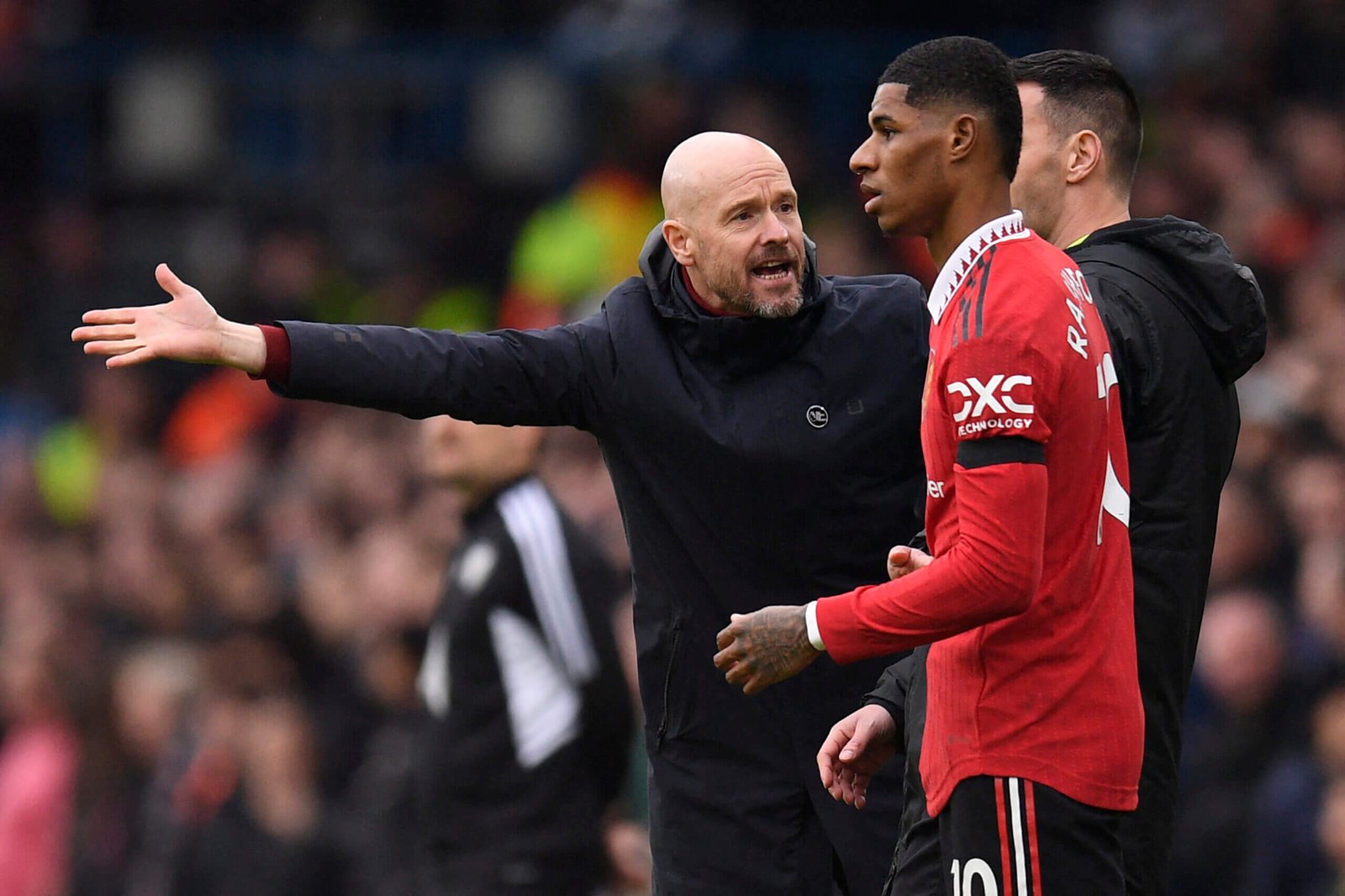
Ten Hag issues an instruction to the forward (OLI SCARFF/AFP via Getty Images)
So much at United is unclear. That includes Ten Hag’s future as well as Rashford’s. The cup final offers an opportunity to end a miserable season on a high, but Rashford seems unlikely to start.
In that Players’ Tribune article, Rashford signed off by suggesting he thrives on being questioned and criticised: “If you back me, good. If you doubt me, even better.”
But it is one of those sentiments that often sounds hollow; he has appeared bruised and worn down by negative coverage, in the mainstream media and social media. Like most players, he looks more like he longs for warmth and appreciation rather than negativity.
For now, though, he finds himself out in the cold — on the margins at United, out of favour with England.
It must be a lonely place, but Marcus Rashford will hope an unwanted summer off gives him the time and space in which to perform a reset to get his career back on track.
(James Gill – Danehouse/Getty Images)
Read the full article here


